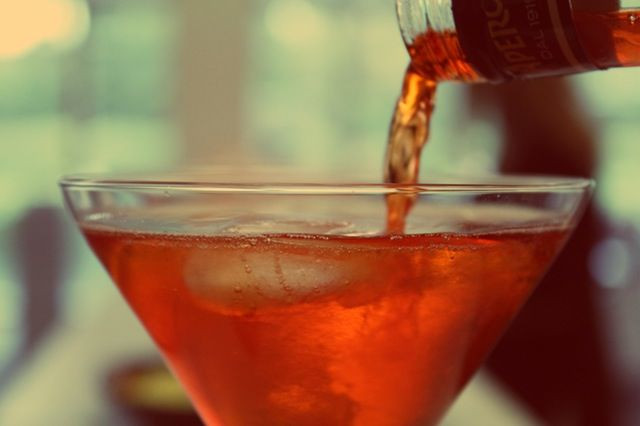Booze Is Not The Key To Happiness: Alcohol Is A Mood Booster For The Moment, Not For Life

A bottle of wine and listening to Beyonce’s Lemonade seem to solve all of life’s problems — or at least in the short term. As we drown our sorrows, we get a liquid surge of pleasure, but does it boost our outlook on life? A recent study published in the journal Social Science & Medicine found we are indeed momentarily happier when we drink alcohol, but that we are just as dissatisfied with life as ever after the last drop.
Previous research has found drinking alcohol triggers the release of endorphins — chemicals that produce feelings of pleasure — in certain areas of the brain. Endorphin activity has been known to increase in the orbitofrontal cortex — the front area of the brain involved with reasoning and decision-making, and the nucleus accumbens, or the brain’s "pleasure center." When released, endorphins produce feelings of pleasure and reward and signal the brain to ask for more of the behavior responsible for these feel-good effects; in this case, drinking alcohol.
Recently, Dr. Ben Baumberg Geiger of the Kent University's School of Social Policy, Sociology and Social Research, and Dr. George MacKerron of the University of Sussex, set out to learn if this feel-good state can prolong happiness over time in a series of two research experiments.
In the first study, researchers observed the moment-to-moment relationship between drinking and happiness using the “Mappiness” app — an app that iPhone users used to describe what they were doing, with whom, and how happy they were. Participants provided more than two million responses in all during random moments throughout the day. On a scale of 0 to 100, they were four points happier when drinking than when not drinking. The iPhone users were happier when drinking, but this did not translate to improved satisfaction with life overall.
In the second study, the team tracked 25,000 people born in 1970 from the ages of 30, 34 and 42, and looked at whether they were more satisfied with life overall at times that they drank more than the times they drank less. Life satisfaction was obtained via self-reports using the question:
“Here is a scale from 0–10 where '0′ means that you are completely dissatisfied and '10′ means that you are completely satisfied. Please enter the number which corresponds with how satisfied or dissatisfied you are about the way you life has turned out so far.”
Drinking was measured through the question:
“In the last seven days, that is not counting today but starting from last [day], how much [drink] have you had?” repeated for beer, wine, spirits, fortified wines and alcopops.
The findings show there is no relationship between how much and how often one drinks and life satisfaction. The exception to this was in situations where alcohol became a problem, which led to reduced feelings of wellbeing, according to the press release.
The authors do conclude these studies show that yes, drinking is fun, and leads to significantly elevated levels of happiness in the moment, but nothing more. Unsurprisingly, developing a drinking problem will negatively affect long-term happiness.
Although these findings are obvious, they are important to inform policy makers of the implications of legislation that involves alcohol use. The researchers hope policymakers take into account happiness when they’re doing cost-benefit analyses of alcohol regulation, and therefore, make informed decisions about what will and will not benefit the population.
So, cheers to that.
Source: Geiger BB and MacKerron G. Can alcohol make you happy? A subjective wellbeing approach. Social Science & Medicine. 2016.



























